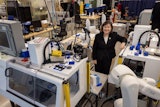There is a continuous barrage of editorials, TV commentators and published stories that denounce the current education system as declining and inferior to other countries.
In general the blame is directed at students, teachers, school administrators, and their curriculums. Everyone seems to be searching for the magic key that will unlock the performance of kids and knock down the barriers to a good education.
One of the most popular solutions to come along in recent years is STEM LEARNING which is supported by the Federal, State, and local governments as well as the manufacturing sector. This program aims to make kids better at science, engineering, technology and math. I am a supporter of the STEM learning initiative, and feel strongly that all citizens (not just students) need to have a better understanding of science. But I have a big question that relates to STEM learning. How can we ask kids to be more interested in science and math when their parents are enamored by pseudo science?
Wikipedia defines pseudo science as “a claim, belief, or practice which is presented as scientific, but which does not adhere to a valid scientific methodology, lacks supporting evidence or plausibility, cannot be reliably tested, or otherwise lacks scientific status. [1] Pseudoscience is often characterized by the use of vague, exaggerated or unprovable concepts. It is an over-reliance on confirmation rather than rigorous attempts at refutation.
Pseudo science ignores the scientific method. It makes conclusions and then looks for facts to support the conclusions. In pseudoscience there is no healthy skepticism about fantastic claims, in fact there is an enthusiasm to accept untested personal testimony as a public truth ( as in the stories about UFOS). It is more about what someone feels then facts. The elevation of individual testimony or sensation over logic and verifiable fact is not only popular; it is often linked to religion, spirituality, popular psychology and cults.
- A recent Time/Yankelvich poll found that 80% of Americans feel that the government is covering up information about extra terrestrials.
- In 1990 a Gallup poll found that 50% of Catholics believe in ESP (extra sensory perception) and 53% believe in UFOS.
- 84% percent of scientists think that humans are warming the planet by burning fossil fuels versus 49% of the public.
- 93% of scientists support federal research on funding on stem cells versus 58% of the public.
- According to the National Science Foundation only 15% of the public follows science news very closely.
- About 46% of the public believes, “God created human beings pretty much in their present form at one time within the last 10,000 years” and this number has not changed since 1982
And here are some more statistics from Carl Sagan’s book the Demon Haunted World
- 63% of American adults are unaware that the last dinosaur died before humans arose.
- 75% do not know that antibiotics kill bacteria and not viruses.
- 57% do not know that electrons are smaller then atoms.
To continue reading the full article, click here to visit our partner publication, PD&D.























